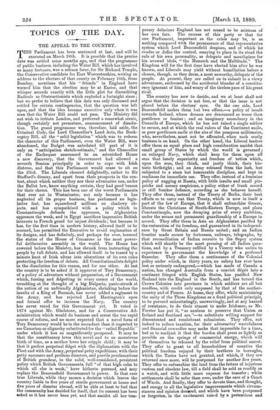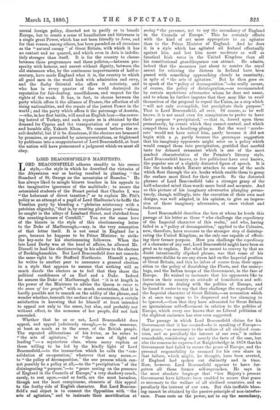TOPICS OF THE DAY.
THE APPEAL TO THE COUNTRY. THIS Parliament has been sentenced at last, and will be executed on March 24th. It is possible that the precise date was settled some months ago, and that the programme of public business, including the Water Bill, which has involved so many fortunes, was a solemn farce, for Sir Richard Temple, the Conservative candidate for East Worcestershire, writing an address to the electors of that county on February 10th, from Bombay, mentions that his " friends" in England have warned him that the election may be at Easter, and that whisper accords exactly with the little plot for discrediting Radicals as Obstructionists which exploded a fortnight since ; but we prefer to believe that this date was only discussed and settled for certain contingencies, that the question was left open, and that the idea became executive only when it was seen that the Water Bill could not pass. The Ministry did not wish to irritate London, and preferred a somewhat scenic, though certainly not premature, announcement of dissolu- tion. The grand programme was, therefore, laid aside, the Criminal Code, the Lord Chancellor's Land Acts, the Bank- ruptcy Bill, all the " solid legislation" which was to redeem the character of this Parliament, even the Water Bill, were abandoned, the Budget was antedated till part of it is only an " anticipation sketch-estimate," and the Chancellor of the Exchequer announced to an astonished House a new discovery, that the Government had allowed a seventh Session principally in order to cope with Irish distress, and that this Parliament would cease to sit on the 23rd. The Liberals cheered delightedly, rather to Sir Stafford's dismay, and apart from their prospects in the con- test, about which neither they nor their adversaries can, under the Ballot law, know anything certain, they had good reason for their cheers. This has been one of the worst Parliaments that ever sat in Westminster, not only because it has neglected all its proper business, has performed no legis- lative feat, has squandered millions on shadowy ob- jects, and has sympathised with a policy which in Constantinople defends the oppressor, in Afghanistan oppresses the weak, and in Egypt sacrifices imperative British interests to French greed for unjust dividends ; but because it has, for the first time in modern history, allowed itself to be scorned, has permitted the Executive to avoid explanation of its designs, and has definitely, and perhaps for ever, lowered the status of the House of Commons as the most power- ful deliberative assembly in the world. The House has cowered before the Ministry, has shrunk from instructing the people by full debate, and has allowed itself to be teased by a minute knot of Irish ultras into alterations of its own rules protecting the freedom of debate. All Constitutionalists delight in the dissolution for this reason, and for one other. At last the country is to be asked if it approves of Tory Democracy, of a policy of adventure without preparation, of a Government which, fussing and fidgetting in every corner of the world, trembling at the thought of a big Bulgaria, panic-struck at the notion of an unfriendly Afghanistan, shrinking before the insults of a King of Burmah, has never added a regiment to the Army, and has rejected Lord Hartington's open and formal offer to increase the Navy. The country has never voted for this Government yet. It voted in 1874 against Mr. Gladstone, and for a Conservative Ad- ministration which would do business and arrest the too rapid course of reform, and no more expected that a novel form of Tory Democracy would be in the ascendant than it expected to see Ctesarism or oligarchy substituted for the " veiled Republic" under which it has so magnificently prospered. It may be that the constituency loves this novel and to us monstrous birth of time, as a mother loves her cripple child ; it may be that it prefers perpetual fidget with the diplomatists with the Fleet and with the Army, perpetual petty expeditions, with their petty successes and perilous disasters, and puerile proclamations of British grandeur, to the solid, well-considered, persistent policy which British Governments, full " of that high calm to which all else is weak," have hitherto pursued, and may replace the Beaconsfield Government in power. In that case true Liberals, while they mourn a decision which leaves the country liable to five years of sterile government at home and five years of disaster abroad, will be able at least to feel that the community has decided for itself, that its consent has been asked as it has never been yet, and that amidst all her tem- porary delusions England has not ceased to be mistress of her own fate. The success of this party or that for one Parliament, important as the crisis may be, is as nothing compared with the permanence of that representative system which Lord Beaconsfield despises, and of which he evades or defies the control, essaying to place in its stead the rule of his own personality, as delegate and mouthpiece for his avowed idols, " the Monarch and the Multitude." The Kingdom will for the first time have elected him after he was known, and Liberals may yield without humiliation before a chosen, though, as they deem, a most unworthy, delegate of the people. At present, they are called on to submit to a viewy adventurer, enthroned by the accidental blunder of a constitu- ency ignorant of him, and weary of the tireless pace of his great rival.
The country has now to decide, and we at least shall not argue that the decision is not free, or that the issue is not placed before the electors' eyes. On the one side, Lord Beaconsfield makes them but two offers,—a policy of insult towards Ireland, whose dreams are denounced as worse than pestilence or famine • and an imaginary ascendancy in the Councils of Europe, which he has not raised a single soldier to secure, and at which the real rulers of the Continent smile, as poor gentlemen smile at the airs of the pompous millionaire, who, nevertheless, must not be affronted, when such costly business is on hand. On the other hand. the Liberal leaders offer them an equal place and high consideration amidst that small group of States by which the world is governed an enlarged Navy, which shall keep for them upon all seas that lonely superiority and freedom of notion which, upon the seas, they think, and justly think, their his- toric birthright ; and an Army released from the lash, but subjected to a stern but honourable discipline, and kept in readiness for immediate use. They offer, instead of a feminine policy of nagging at Russia, with little insults and small pin- pricks and uneasy suspicions, a policy either of frank accord or still franker defiance, according as she behaves herself. They offer them, instead of the Treaty of Berlin, their best efforts so to carry out that Treaty, which is now in itself a part of the law of Europe, that it shall enfranchise Greece, liberate the Christians of South-Eastern Europe, and place Constantinople, now the decaying prize of every ambition, under the secure and permanent guardianship of a Europe in. accord. They offer them in Asia an Afghanistan pacified by the restoration of its freedom, and guaranteed in its independ- ence by Great Britain and Russia united ; and an Indian frontier made secure by fortresses, railways, telegraphs, by that reconciliation of Indian recruits to the Sepoy system which will shortly be the most pressing of all Indian ques- tions, and by a Treasury refilled by a Viceroy who unites to. experience in government the knowledge of a profound financier. They offer them a continuance of the Colonial policy under which, in thirty years, no colony has ever been lost or seriously endangered,—which has made of Canada a nation, has changed Australia from a convict depot into a continent fringed with English States, has pacified New Zealand into the England in the South, and has turned the Crown Colonies into provinces in which soldiers are all but needless, with credit only surpassed by that of the mother- country and of France. At home, they offer, while maintaining the unity of the Three Kingdoms as a fixed political principle, to be pursued unhesitatingly, unswervingly, and at any hazard of resistance, to do their utmost to make Irishmen, as Mr. Forster has put it, " as anxious to preserve that Union as Ireland and Scotland are,"—to substitute willing support for discontented and recalcitrant submission. They offer, not indeed to reduce taxation, for their adversaries' wastefulness and financial cowardice may make that impossible for a time, but so to readjust it that the burden shall press as lightly as possible on the springs of commercial energy, which will of themselves be released by the relief from political unrest. They offer to grant to all householders of counties the political freedom enjoyed by their brethren in boroughs, which the Tories have not granted, and which, if they are returned once more, will be postponed for another five years. They offer to enfranchise the land from the fetters of injurious custom and obsolete law, till a field shall be sold as readily as a watch, and with little more expense for transfer ; while settlements shall be safer than ever, under the care of a Court of Wards. And finally, they offer to devote time, and thought, and energy to all the legislative improvements which circum- stances and opinion demand, and which have been postponed or forgotten, in the excitement raised by a pretentious and
unreal foreign policy, directed not to pacify or to benefit Europe, but to create a sense of humiliation and bitterness in a single great Power, which has not been friendly to Jews, and for that reason, among others, has been paraded on all occasions as the " natural enemy " of Great Britain, with which it has no contact and no quarrel, and which even in Asia is indefin- itely stronger than itself. It is for the country to choose between these programmes and these policies,—between pro- sperity with honour, and unrest without dignity, between the old statesmen whcr, by the continuous improvements of half-a- century, have made England what it is, the country to which all good men in the world look with admiration and envy, and the flashy Oriental who offers it notoriety, and who has in every quarter of the world destroyed its reputation for fair-dealing, unselfishness, and respect for the rights of the weak. It has, in fact, to choose between the party which offers it the alliance of France, the affection of all rising nationalities, and the repute of the justest Power in the world ; and the party which offers it the patronage of Austria, —who, in her first battle, will need an English loan—the cower- ing hatred of Turkey, and such repute as is obtained by the demand for Cyprus and the transportation of our protected and humble ally, Yakoob Khan. We cannot believe the re- sult doubtful, but if it be disastrous, if the electors are bemused by promises, or persuaded by misrepresentations, or frightened by publicans into a reappointment of Lord Beaconsfield, at least the nation will have pronounced a judgment which we must all obey.



































 Previous page
Previous page